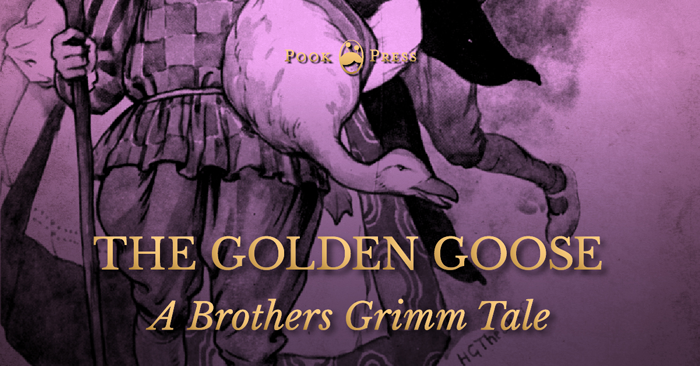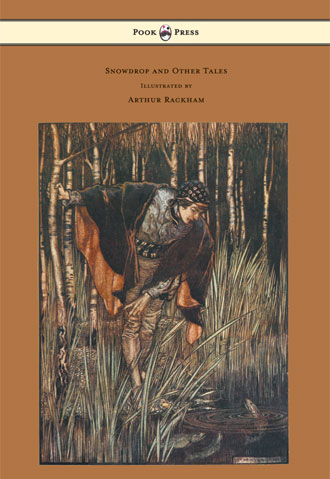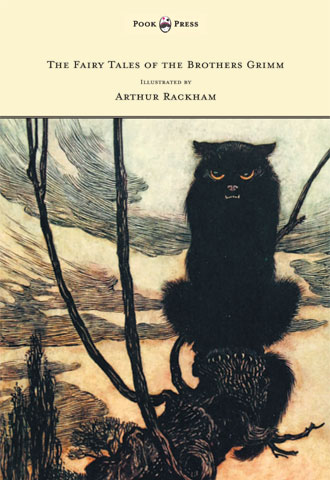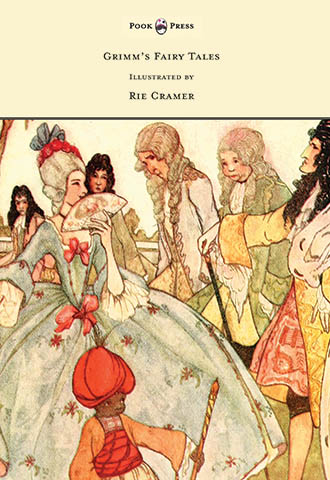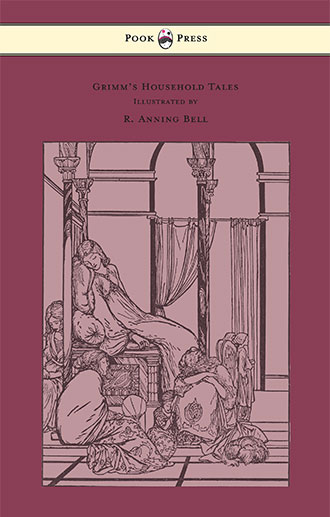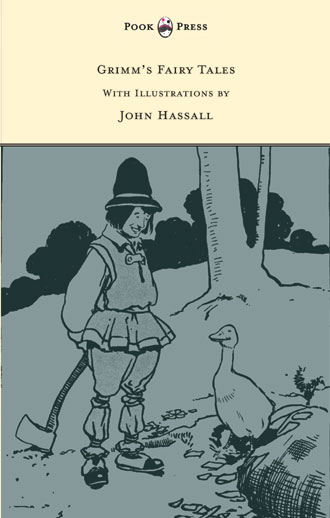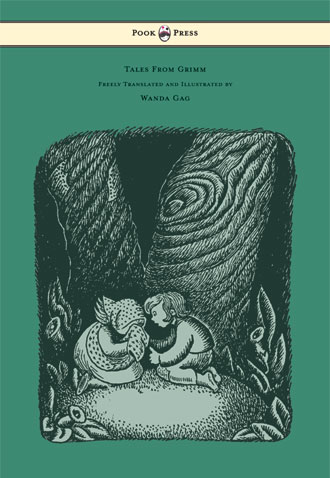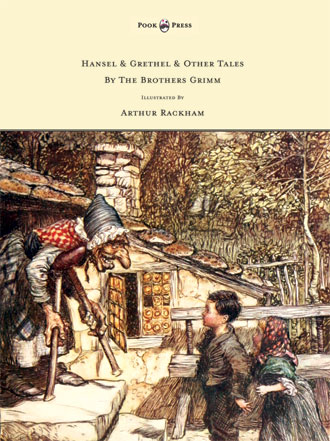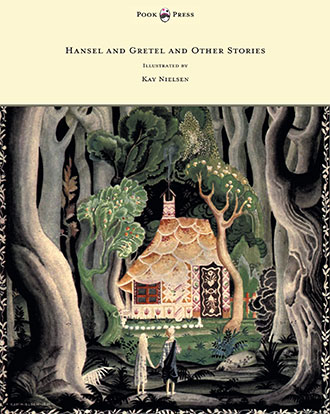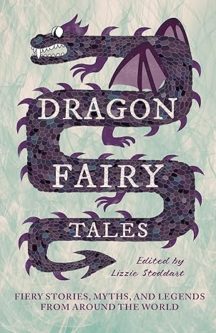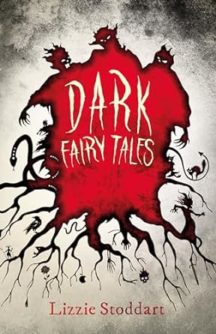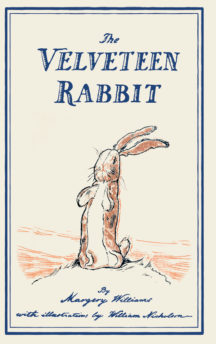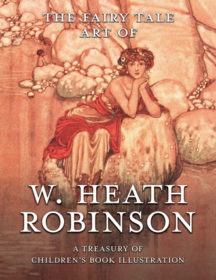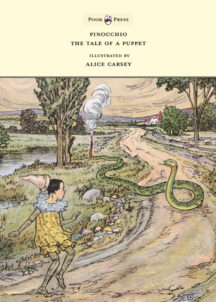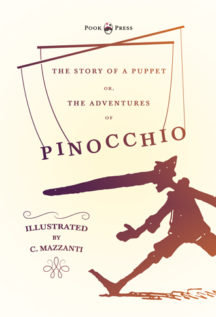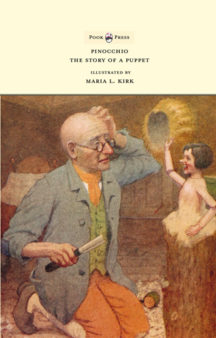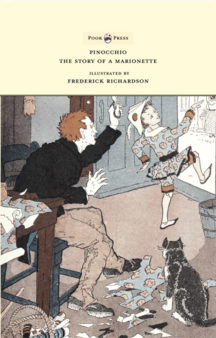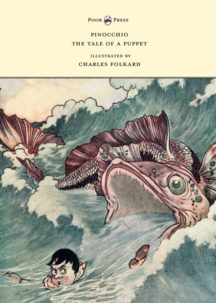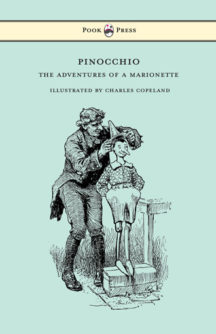The Golden Goose – A Brothers Grimm Tale
A goose of golden feathers, a band of merry followers, and a princess who would not laugh.
The Golden Goose
– A Brothers Grimm Tale –
THERE was once a man who had three sons. The youngest of them was called Simpleton; he was scorned and despised by the others, and kept in the background.
The eldest son was going into the forest to cut wood, and before he started, his mother gave him a nice sweet cake and a bottle of wine to take with him, so that he might not suffer from hunger or thirst. In the wood he met a little, old, grey Man, who bade him good-day, and said, ‘Give me a bit of the cake in your pocket, and let me have a drop of your wine. I am so hungry and thirsty.’
But the clever son said: ‘If I give you my cake and wine, I shan’t have enough for myself. Be off with you.’
He left the little Man standing there, and went on his way. But he had not been long at work, cutting down a tree, before he made a false stroke, and dug the axe into his own arm, and he was obliged to go home to have it bound up.
Now, this was no accident; it was brought about by the little grey Man.
The second son now had to go into the forest to cut wood, and, like the eldest, his mother gave him a sweet cake and a bottle of wine. In the same way the little grey Man met him, and asked for a piece of his cake and a drop of his wine. But the second son made the same sensible answer, ‘If I give you any, I shall have the less for myself. Be off out of my way,’ and he went on.
His punishment, however, was not long delayed. After a few blows at the tree, he hit his own leg, and had to be carried home.
Then Simpleton said, ‘Let me go to cut the wood, father.’
But his father said, ‘Your brothers have only come to harm by it; you had better leave it alone. You know nothing about it.’ But Simpleton begged so hard to be allowed to go that at last his father said, ‘Well, off you go then. You will be wiser when you have hurt yourself.’
There stands an old tree; cut it down, and you will find something at the roots.
His mother gave him a cake which was only mixed with water and baked in the ashes, and a bottle of sour beer. When he reached the forest, like the others, he met the little grey Man, who greeted him, and said, ‘Give me a bit of your cake and a drop of your wine. I am so hungry and thirsty.’
Simpleton answered, ‘I only have a cake baked in the ashes, and some sour beer; but, if you like such fare, we will sit down and eat it together.’
So they sat down; but when Simpleton pulled out his cake it was a sweet, nice cake, and his sour beer was turned into good wine. So they ate and drank, and the little Man said, ‘As you have such a good heart, and are willing to share your goods, I will give you good luck. There stands an old tree; cut it down, and you will find something at the roots.’
So saying he disappeared.
Simpleton cut down the tree, and when it fell, lo, and behold! a Goose was sitting among the roots, and its feathers were of pure gold. He picked it up, and taking it with him, went to an inn, where he meant to stay the night. The landlord had three daughters, who saw the Goose, and were very curious as to what kind of bird it could be, and wanted to get one of its golden feathers.
The eldest thought, ‘There will soon be some opportunity for me to pull out one of the feathers,’ and when Simpleton went outside, she took hold of its wing to pluck out a feather; but her hand stuck fast, and she could not get away.
And so they followed up hill and down dale after Simpleton and his Goose.
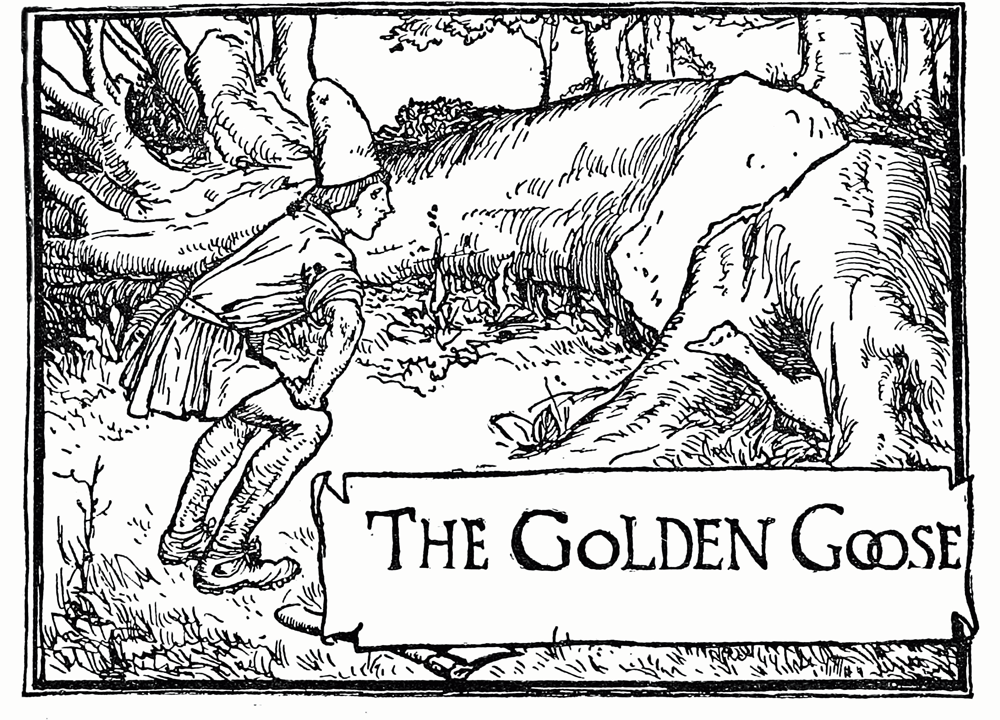
Soon after, the second sister came up, meaning also to pluck out one of the golden feathers; but she had hardly touched her sister when she found herself held fast.
Lastly, the third one came, with the same intention, but the others screamed out, ‘Keep away! For goodness sake, keep away!’
But she, not knowing why she was to keep away, thought, ‘Why should I not be there, if they are there?’
So she ran up, but as soon as she touched her sisters she had to stay hanging on to them, and they all had to pass the night like this.
In the morning, Simpleton took up the Goose under his arm, without noticing the three girls hanging on behind. They had to keep running behind, dodging his legs right and left.
In the middle of the fields they met the Parson, who, when he saw the procession, cried out: ‘For shame, you bold girls! Why do you run after the lad like that? Do you call that proper behaviour?’
Then he took hold of the hand of the youngest girl to pull her away; but no sooner had he touched her than he felt himself held fast, and he, too, had to run behind.
Soon after the Sexton came up, and, seeing his master the Parson treading on the heels of the three girls, cried out in amazement, ‘Hullo, your Reverence! Whither away so fast? Don’t forget that we have a christening!’
So saying, he plucked the Parson by the sleeve, and soon found that he could not get away.
As this party of five, one behind the other, tramped on, two Peasants came along the road, carrying their hoes. The Parson called them, and asked them to set the Sexton and himself free. But as soon as ever they touched the Sexton they were held fast, so now there were seven people running behind Simpleton and his Goose.
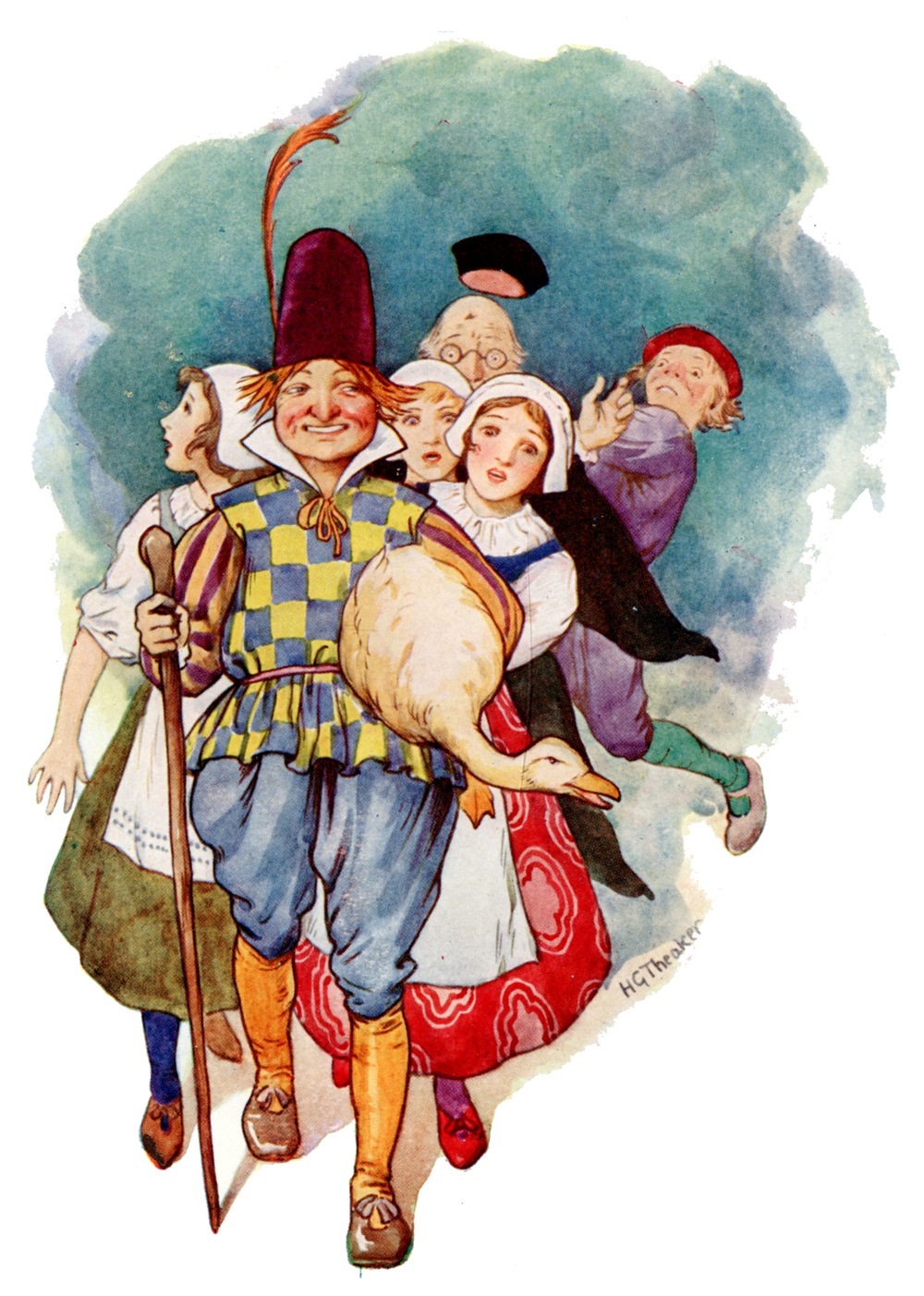
By-and-by they reached a town, where a King ruled whose only daughter was so solemn that nothing and nobody could make her laugh. So the King had proclaimed that whoever could make her laugh should marry her.
When Simpleton heard this he took his Goose, with all his following, before her, and when she saw these seven people running, one behind another, she burst into fits of laughter, and seemed as if she could never stop.
Thereupon Simpleton asked her in marriage. But the King did not like him for a son-in-law, and he made all sorts of conditions. First, he said Simpleton must bring him a man who could drink up a cellar full of wine.
Then Simpleton at once thought of the little grey Man who might be able to help him, and he went out to the forest to look for him. On the very spot where the tree that he had cut down had stood, he saw a man sitting with a very sad face. Simpleton asked him what was the matter, and he answered—
‘I am so thirsty, and I can’t quench my thirst. I hate cold water, and I have already emptied a cask of wine; but what is a drop like that on a burning stone?’
‘Well, there I can help you,’ said Simpleton. ‘Come with me, and you shall soon have enough to drink and to spare.’
He led him to the King’s cellar, and the Man set to upon the great casks, and he drank and drank till his sides ached, and by the end of the day the cellar was empty.
Then again Simpleton demanded his bride. But the King was annoyed that a wretched fellow called ‘Simpleton’ should have his daughter, and he made new conditions. He was now to find a man who could eat up a mountain of bread.
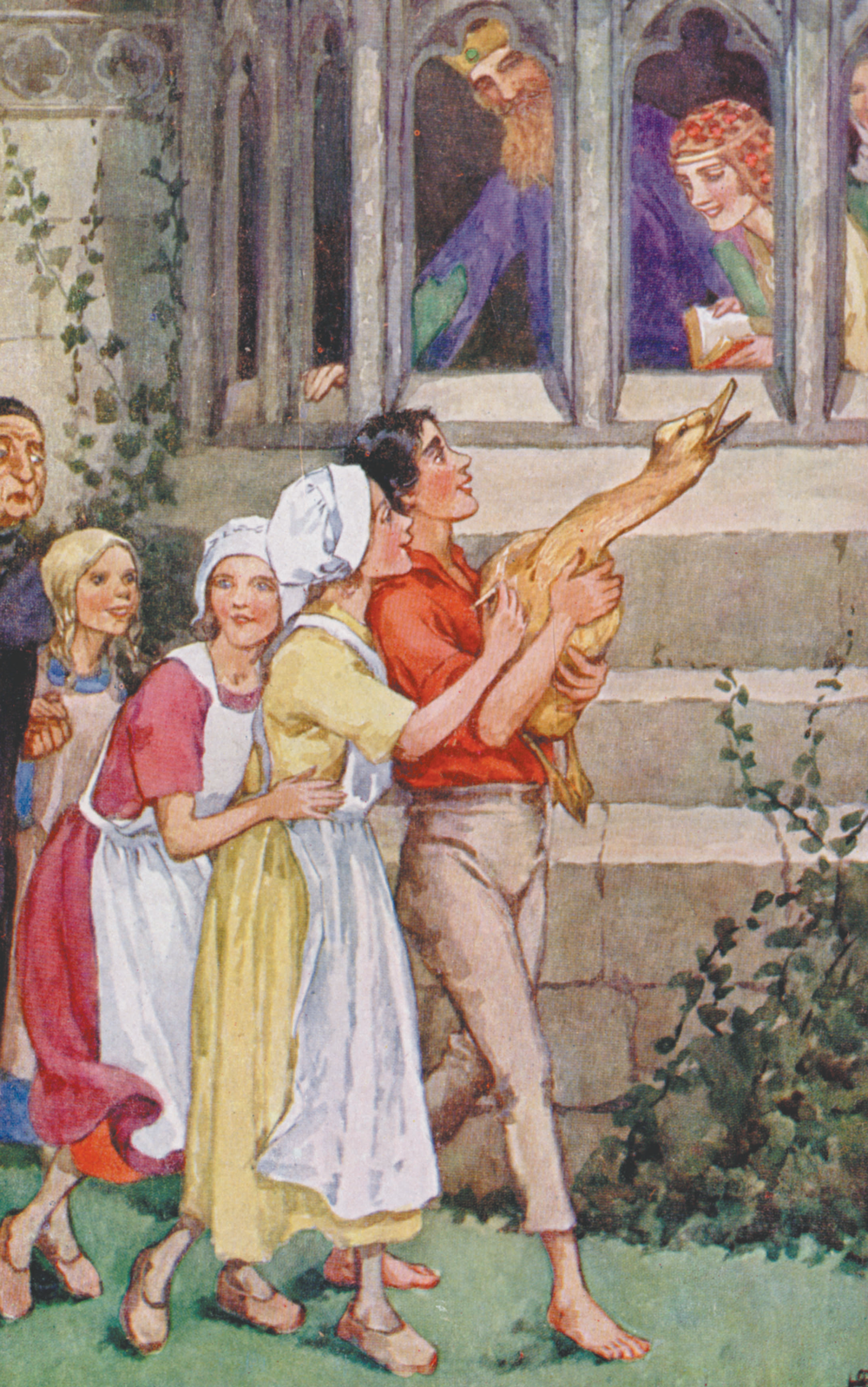
Simpleton did not reflect long, but went straight to the forest, and there in the self-same place sat a man tightening a strap round his body, and making a very miserable face. He said: ‘I have eaten up a whole ovenful of rolls, but what is the good of that when any one is as hungry as I am. I am never satisfied. I have to tighten my belt every day if I am not to die of hunger.’
Simpleton was delighted, and said: ‘Get up and come with me. You shall have enough to eat.’
And he took him to the Court, where the King had caused all the flour in the kingdom to be brought together, and a huge mountain of bread to be baked. The Man from the forest sat down before it and began to eat, and at the end of the day the whole mountain had disappeared.
Now, for the third time, Simpleton asked for his bride. But again the King tried to find an excuse, and demanded a ship which could sail on land as well as at sea.
‘As soon as you sail up in it, you shall have my daughter,’ he said.
Simpleton went straight to the forest, and there sat the little grey Man to whom he had given his cake. The little Man said: ‘I have eaten and drunk for you, and now I will give you the ship, too. I do it all because you were merciful to me.’
Then he gave him the ship which could sail on land as well as at sea, and when the King saw it he could no longer withhold his daughter. The marriage was celebrated, and, at the King’s death, the Simpleton inherited the kingdom, and lived long and happily with his wife.
The King could no longer withhold his daughter.
* * * * *
This story was taken from the book:
Snowdrop and Other Tales – Illustrated by Arthur Rackham
Snowdrop and Other Tales was originally published in 1909, and contains a collection of classic fairy tales by the Brothers Grimm – all beautifully illustrated by Arthur Rackham. The stories include: ‘Briar Rose, ‘The Elves and the Shoemaker’, ‘Clever Hans’, ‘The Goosegirl’, ‘The Seven Ravens’, ‘Ashputtel’, ‘Clever Grethel’, and many more.


